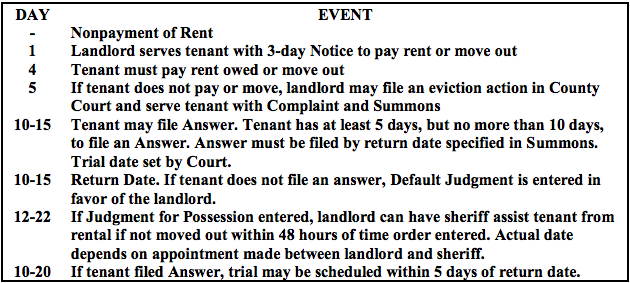Colorado is a unique state for rental laws considering Marijuana is legal. In this article, we will provide you with the major rental laws in Colorado as well as give you additional sources to learn more about a particular rental legal subject.
| General | |
| Insurance | The State of Colorado does not require a landlord to compensate a tenant for damage to that tenant’s personal property. |
|
Responsibility to Repair and Maintain the Rental
|
Under Colorado law, a landlord has a responsibility to repair the rental property during the lease term under the following circumstances: |
| The lease contains a specific agreement that specifies that the landlord is responsible for repairing or maintaining the rental | |
| A residential rental is uninhabitable or unfit for the uses reasonably intended by the parties. (See C.R.S. §§38-12-501 thru 511). | |
| A residential rental is in a condition materially dangerous or hazardous to the tenant’s life, health or safety. (See C.R.S. §§38-12-501 thru 511). | |
| There is a specific agreement between the landlord and the tenant that the landlord will make specified repairs | |
| There is a hazardous condition caused by gas-burning equipment. (See C.R.S. §38-12-104). | |
| The repairs are needed in common areas of multi-unit properties, like parking lots, sidewalks, stairways and hallways, to keep them safe. A landlord must exercise reasonable care to protect against known dangers. (See C.R.S. §13-21-115). | |
| Abandoned Property | By law, the landlord must give the tenant at least 15 days written notice by registered or certified mail, addressed to the tenant’s last known address, before selling or disposing of the property. |
| Marijuana Laws | Property owners may prohibit or otherwise regulate the possession, consumption, use, and growth of marijuana on their property. Landlords should incorporate a crime and drug-free lease clause into his or her lease agreement. |
| Rent and Deposits | |
| Security Deposit | No statute – The amount of the security deposit should be written into the lease |
| Reasons to Withhold Security Deposit | Nonpayment of rent; Abandonment of premises; Nonpayment of utility charges; Nonpayment of repair work; or Nonpayment of cleaning contracted for by the tenant |
| Security Deposit Return | According to section 38-12-103 (1), C.R.S., a landlord must return to the tenant the full security deposit one month after the termination of the lease or the surrender of the key to the leased property, whichever date is later, unless the lease agreement specifies a longer period. However, that longer period cannot be more than 60 days.3 |
| Tenant’s Recourse for Withheld Security | If the landlord does not either return the entire security deposit or send an itemized list of deductions, along with any remaining portion of the security deposit, within the required time period, the landlord forfeits all rights to withhold any of the security deposit. (C.R.S. §38-12-103(2)) |
| Security Deposit Maximum | No Statute |
| Subleases and Assignments | A lease may allow, or may specifically prohibit, subleasing and/or assignments. Subleases and assignments can happen only with a landlord’s permission |
|
Unenforceable Lease Clauses
|
Requiring a tenant to waive the right to the return of the security deposit |
| Waiving a landlord’s responsibility for acts of gross negligence | |
| Requiring a tenant who has been called into military service before the end of a lease term to pay for the remainder of rent due for their entire lease term. (See Federal Soldiers and Sailors Civil Relief Act (50 U.S.C. App. §534). | |
| Requiring a tenant to waive the covenant of quiet enjoyment of the premises | |
| Requiring a tenant to waive the warranty of habitability of the premises. (See C.R.S. §38-12- 503). | |
| Allowing the landlord to forcibly remove a tenant and the tenant’s personal property without going through the eviction process as required by Colorado law. (See C.R.S. §§13-40-101 thru 123). | |
| Tenant consent to eviction for non-payment of rent, or for any other reason, without a 3-day Notice as required by Colorado statute. (See C.R.S. §§13-40-01 thru 123). | |
| Lease and Agreements | |
| What if property is sold? | A landlord cannot terminate a lease early simply because the landlord wishes to sell the property, unless the lease expressly gives the landlord such a right. |
| Eviction | The only way a landlord can terminate a lease and evict a tenant from any type of rental property is by going through a Forced Entry and Detainer (FED) legal action to obtain a court order requiring the tenant to vacate the property |
|
Reasons for Eviction
|
Tenant has failed to pay rent, or |
| Tenant has violated a term of the lease, or | |
| Tenant has committed a substantial violation while in possession of the rental premises, which may include, for example, a violent or drug-related felony on or near the rental property or an act on or near the rental property which substantially endangers a person or the landlord’s property (see C.R.S. §13-40-107.5), or | |
| Tenant refuses to leave the rental after the end of the lease, which includes a month-to-month tenant staying on after the landlord has given required notice that the lease will not be renewed at the end of the month. |
Typical Eviction Timetable
 Sources:
Sources:
Colorado.gov – Landlord / Tenant
FED
















